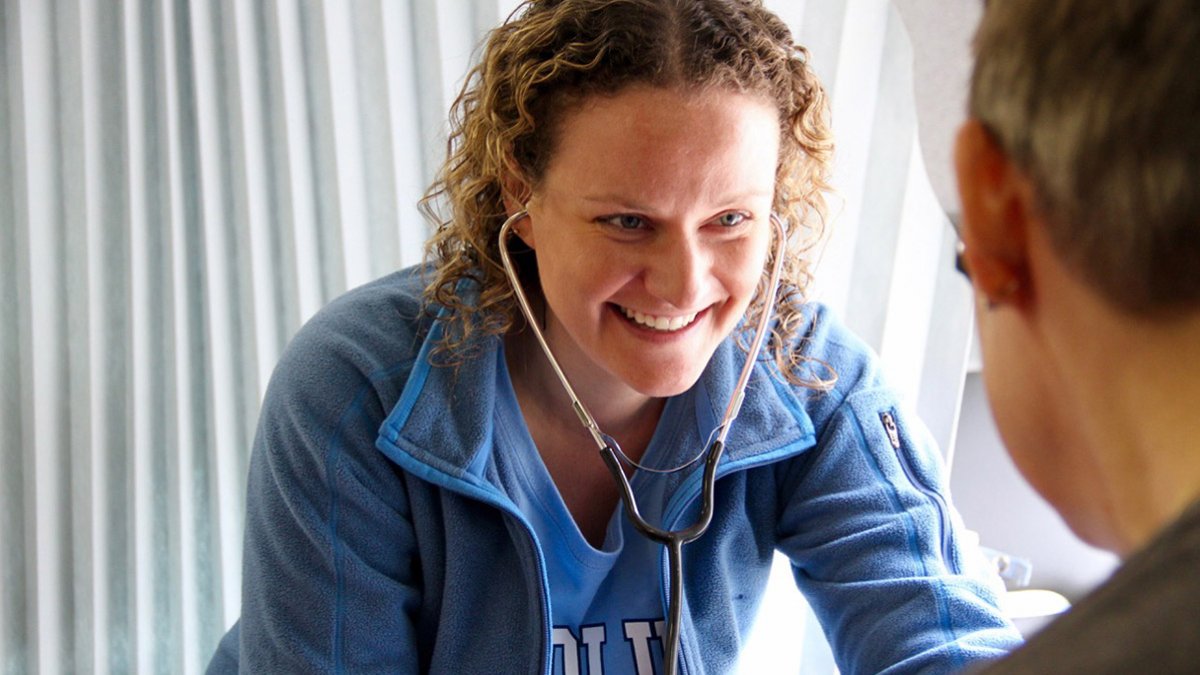Delivering care where it’s needed most
Inspired by a conversation at her church, Professor Marianne Cockroft spearheaded the creation of a School of Nursing mobile health care clinic, which sets up shop each week outside ministries in Cary and in Apex.

The men and women who come to Dorcas Ministries are in need. In need of a meal, in need of counseling, in need of secure housing.
In need of care.
And that puts them squarely within the mission of the UNC School of Nursing.
“We’re really invested in the well-being of the whole community,” said Professor Marianne Cockroft, standing just outside the storefront entrance of Dorcas on a cold and blustery February morning. “Every visit we have here is meaningful.”
Inspired by a conversation at her church, Cockroft spearheaded the creation of a School of Nursing mobile health care clinic, which sets up shop each week outside Dorcas Ministries in Cary and Western Wake Crisis Ministry in Apex. Operating from a specially equipped van rented from the UNC School of Medicine, the clinic offers free checkups, health counseling and referrals. The effort is funded by a grant from Cockroft’s congregation at Christ the King Lutheran Church in Cary.
“It really fills a gap in the community,” said Howard Manning, executive director of Dorcas Ministries. “It not only improves the quality of life for people, but it’s a much more economical approach to health problems.”
More than 73 percent of the clients at Dorcas and Western Wake Crisis Ministries suffer from at least one chronic illness. Treatment for those conditions can fall by the wayside when more immediate life troubles intrude, and that can lead to long-term health complications and much steeper costs. By offering a free consultation and medical counseling at the crisis ministries, Cockroft and her colleagues hope to prevent more severe problems down the road.
“Stress can make chronic health problems more troublesome,” Cockroft said. “And most of the people we’re seeing here are facing pretty significant stress in their lives. We can educate people on ways to manage their health care, and connect them with other resources in the area.”
Behind her, a mother and daughter climbed aboard the van for a checkup. The mobile clinic is staffed by faculty volunteers from the School of Nursing, along with nursing students on clinical rotation. The mobile site is offering an especially rich education for nursing students interested in public health. Diabetes, high blood pressure and other chronic conditions are some of the most common concerns, but nurses have to be prepared for anything.
“It gives me some very direct insight into community health needs,” said Katie Steinheber, a nurse at Duke University Hospital who is pursuing her master’s degree at UNC. “Some people have very specific health questions, and some people just want to be able to talk to someone, to debrief about their health problems and their worries.”
Finding ways to serve patients outside the medical mainstream is crucial in reducing the overall burden of health care. A 2014 study in the American Journal of Managed Care found that mobile clinics “have a critical role to play in providing high-quality, low-cost care to vulnerable populations.”
At UNC, Cockroft won immediate support for taking nursing expertise on the road. “The faculty have been great, just really enthusiastic,” she said. “There’s so much potential for what we could do with this.”
Realizing that potential will mean measuring outcomes for the mobile clinic, a major challenge working with low-income and often transient populations. School of Nursing faculty are already considering ways to measure the value of preventative care, mainly in terms of costs avoided through timely intervention.
“We have to show results if we want to grow,” Cockroft said. “We need to find out, if we weren’t here, where would these folks have gone? Would they have gone to the emergency room, or nowhere at all?”
In the Dorcas parking lot, the nurses working directly with grateful patients are already convinced. “Did you see how relieved she was?” asked Assistant Professor Wanda Wazenegger, speaking about a patient who spent more than twenty minutes in the mobile clinic. “She was so glad to have someone to talk to, someone to care.”
Then Wazenegger went back to organizing the van, readying for the next patient.




